Peter MALONE
Saturday, 18 September 2021 19:21
Trapped
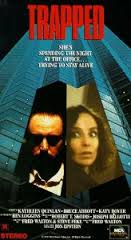
TRAPPED
US, 1989, 93 minutes, Colour.
Kathleen Quinlan.
Directed by Fred Walton.
Trapped is a thriller about a big city skyscraper, co-written and directed by Fred Walton (When a Stranger Calls, April Fools Day). It has overtones of ecological pollution, deaths by accident and vengeance. However, many of these themes are not explained. The focus is on Kathleen Quinlan as Mary- Anne, an executive in charge of the development of the building who is trapped with a vengeful killer. The film spends a lot of time on atmosphere and fright rather than character development. It is an enjoyable telemovie - but is a short story, prolonged.
1.Enjoyable thriller? Atmosphere? Themes? Characters?
2.The city, the building, the detail of the offices, stairwells and lifts? The open area? The technology guarding a building? The special effects for stunt work, for fright? Editing and pace? Musical score?
3.The title and the overall focus of the film?
4.Kathleen Quinlan as Mary- Anne: her manner, dress, businesslike efficiency? Showing clients the building? Security? Her relationship with her friend? The audience learning about the building from her? The evening, the encounter with the executives? Leaving with her friend, wariness about security? Her staying, moving through the building, the death of her friend, the death of the security guards? The encounter with John, finding out who he was? The killer? Locked, out the window, saving herself? Working with John, the knife? The mystery of the intruder? His getting away? The aftermath of the experience and the night?
5.The credits, the photos, pollution, the headlines, death? The murderer and his planting explosive devices, controlling the building and its security? The deaths of the security guards? The stalking of Mary- Anne, the clashes with John? His injuries? The motivation behind his attacks?
6.John, industrial spy, in the building, clash with Mary -Anne, with the murderer? Stalking the murderer, getting away?
7.The friend, her work, support of Mary- Anne, sharing the searching, her sudden death?
8.The picture of the police, the investigations, the security guards?
9.Conventional thriller? The audience experiencing the sense of mystery and menace? How to react in such circumstances?
Published in Movie Reviews
Published in
Movie Reviews
Tagged under
Saturday, 18 September 2021 19:21
Toughlove

TOUGHLOVE
US, 1985, 100 minutes, Colour.
Lee Remick, Bruce Dern, Piper Laurie, Louise Latham, Jason Patric.
Directed by Glen Jordan.
ToughLove is an American telemovie of the mid-'80s with a social message for parents, alerting them to the problems of teenagers and the possibility of group support. The film is strongly anti-drugs.
It is typical of so many of the telemovies of the period, well made for a wide audience - in this case, especially, an affluent white audience. Lee Remick gives a sturdy performance as usual. Bruce Dern is very good as her schoolteacher husband who wants to ignore the problems and smooth them over. There is a good performance also by Piper Laurie as a worried mother - the film opens with her monologue about her problems. The film introduces Jason Patric (Solar Babies, Lost Boys). It is directed by Glenn Jordan, director of many telemovies including The Women's Room with Lee Remick, Les Miserables and feature films like Mass Appeal. The good message telemovie.
1.The impact of the film? Telemovie style? American situations? Universal? Problems?
2.The affluent settings, the homes, schools, the places where the teenagers hang out? The adult world, group support? Prisons? Musical score?
3.The style of the telemovie, the stars and the message, the domestic sequences, the drug sequences, the close-ups of characters in distress? Designed for a wide home audience?
4.The opening with Darlene: the close-up, her monologue about her problems and her relationship with her daughter? Arresting audience attention? Her work in the group, Kristin at home, their fights, complaints, the drugs, Kristin's friendship with Gary? Darlene and Jan and their friendship, sharing? Darlene and her strict rules with Kristin - especially threatening the selling of her clothes and possessions? Her death, her mother's grief, the funeral, Gary's absence and Scot giving him the news?
5.Jan and Rob and the ideal American home, their life and style, ordinary lifestyle, relationship with their sons, tension between themselves? Rob and his hopes for promotion? Jan and her caution, worrying about Gary? Observing the group, joining it? Rob and his resentment, not wanting to tell his story to strangers, considering these parents failures? His walking out? yet his having to return? Relying on group support? Buying the car for Gary? Favouring Gary, not favouring Scott? His having answers for the problems, bypassing the facts? Jan and her emotional concern? The behaviour of their son, going to the police station, the hospital for truth? Hearing the truth about Gary and drugs? Kristin? The meetings, Rob not getting his promotion because of his failure with his son? The group offering tough rules, their locking Gary out, letting him stay in jail for the 30 days, even during Thanksgiving? The stress on each? Jan and her emotional collapse? The couple with their son giving Gary the rules? His leaving, their worrying that they would never see him again? Tension, his return, throwing the drugs away, accepting the rules?
6.The portrait of Gary, the 17-year-old, background at school, friends? His relationship with Scott? Rivalry? His feeling bad, involved in the drug world, the drinks? Friendship with Kristin, the group, getting high, dangerous driving? Kristin's death? The reaction of his parents, their wanting him to go to therapy, the rules and his rejection of them? Going to jail and being left there, his desperate phone call? The return home, his leaving? Scott finding him out, telling him of Kristin's death? His decision to come home and abide by the rules?
7.The portrait of Scott, the younger son, not involved in the drugs, wanting to share his brother's life, the rivalry between them, feeling his parents ignoring him, overhearing their quarrels? His going to see Scott and challenging him?
8.Kristin, her friends, the drug group, their reckless behaviour, death wishes?
9.The couple from the group, the group work, the therapy? The rules? An interested couple with their reformed son, Gary's ignoring them? Finally abiding by the rules?
10.The principal, his friendship with Rob, not promoting him - the validity of the reasons? Hurting Rob?
11.The theme of drugs, self-hatred of teenagers, family love and discipline, making the right decisions about how hard to be - and the title of Tough Love?
Published in Movie Reviews
Published in
Movie Reviews
Tagged under
Saturday, 18 September 2021 19:21
Touchez Pas Au Grisbi
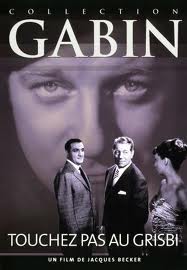
TOUCHEZ PAS AU GRISBI
France, 1953, 90 minutes, Black and white.
Jean Gabin, Jeanne Moreau, Lino Ventura.
Directed by Jacques Becker.
Touchez Pas Au Grisbi (Don't Touch the Loot) is an effective mid-'50s portrait of the gangster milieu at the time. It models itself on the American film noir (which in turn were echoes of French gangster thrillers of the '30s and '40s). It shows the influence of such films as John Huston's The Asphalt Jungle as well as Jules Dassin's Rififi. The focus is not so much on crimes and their execution but rather the portrait of the gangsters, their interactions, decisions, and the milieu in which they lived and worked.
The film was directed by Jacques Becker, director of a number of notable films of the '40s and '50s including Casque d'Or. The film takes advantage of the screen image of celebrated French actor Jean Gabin, star of so many of the films of the '30s including Pepe le Moko. The film also features Jeanne Moreau in an early role and also Lino Ventura as the leader of the rival gang.
1.Interesting gangster film? Atmosphere, characters, confrontations? In the mode of the film noir of the '40s and '50s? The popularity of this kind of gangster study in the period?
2.Black and white photography, night and day, light and darkness? The interiors of the cafes, apartments? The outdoor sequences, the streets, the country roads? Confrontations and shoot-outs? Songs, glamour of the nightclubs, musical score?
3.The title, its tone? Applied to the action of the film?
4.The film as a character study: of Max, of his associates, of their women, of rival gangs? The French milieu? Robberies, the police, honour and dishonour amongst thieves, nightclubs, the spread of drug-dealing?
5.Jean Gabin and his screen presence: as Max, age, experience, wanting to retire? The stealing of the gold? In the nightclub, his relationship with Riton, with Marco, discussions with Angelo, lending him Marco? His knowledge of his associates, tolerance? The relationship with Lola? The nightclub, the cafe, the reliance on the Bouches? Catching Josy with Angelo? Speaking to Riton on her behalf? Going to the apartment, the discovery of the plot, the phone call to Riton? The attempt on his life? The pursuit, the taking of Riton, the deal? Hiding the ingots with his wealthy friends? The encounter with the woman? His going to the exchange with Riton, the double-dealing, the shooting and killings, the exploded car? Not getting the money? Portrait of a gangster? His future?
6.Riton as his associate, ladies' man, the relationship with Josy, her wanting to get out of the relationship? His talking too much? Getting out of the job with Angelo and his crony? Being taken, injured? The exchange? His being shot, hospital, death?
7.Angelo and his gang, the up and coming group, ruthless, drugs, associates, drivers and dealers? Double-dealing? With the women? Trying to get rid of the older brigade? The set-up for the exchange, the shooting, the explosion?
8.The minor crooks, Marco and Roman, as drivers, as dealers?
9.The Bouches, the cafe, looking after the criminals, contacts?
10.Pierrot and his support of Max, hiding the money, family relationships, arrangements for hiding gold? The confrontations?
11.Josy and Lola, their relationships, prostitutes, singers in the nightclub, changing relationships, betrayals?
12.A portrait of the period? The ugly side of French society? The codes of the gangsters?
Published in Movie Reviews
Published in
Movie Reviews
Tagged under
Saturday, 18 September 2021 19:21
Two Mothers for Zachary
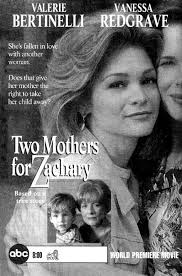
TWO MOTHERS FOR ZACHARY
US, 1996, 95 minutes, Colour.
Valerie Bertinelli, Vanessa Redgrave, James Gammon.
Directed by Peter Werner.
Two Mothers for Zachary is an American telemovie, designed for the home audience, making a special pleading case. Valerie Bertinelli portrays a mother who has exhibited irresponsibility but, after giving birth, enters into a lesbian relationship. Her mother, played by Vanessa Redgrave, disapproves and fights in the courts for the custody of the son.
The film makes an emotional as well as an intellectual appeal for the possibility of a lesbian mother in a relationship rearing her son. However, the Commonwealth of Virginia in its legislation prohibits this kind of arrangement and argues for the protection of the child by giving custody to the grandmother.
The film takes a strong viewpoint, argues its case and draws an emotional response from the audience. However, it probably will not persuade those opposed to the idea to change their minds.
An example of the role of the American telemovie in influencing public opinion.
1.The impact of the telemovie? Its themes and issues? Social concern, moral concern? The good of the child, family?
2.The film as a case of special pleading? Its stance on its issues? The good of the child, the good of the mother, the mother and her relationship and its effect on the child? Issues of custody, education?
3.Richmond, Virginia, the Virginia setting? The city, the homes, the courts?
4.The title and its comment on the roles of Jody and Nancy? Audiences having to decide in favour of one or the other?
5.The opening, Nancy and the demand for the child? Going back 18 months? Nancy and the joy of the birth of the child? Her assisting at the birth? The effect of the birth, Jody and the experience, her clashes with Keith during the birth? The joy of the child? Keith's mother and holding the baby, Nancy's reaction?
6.The initial experience of Jody with the child? The support of her mother? Keith and his giving up rights to care for the child? Jody and her getting a job, her friendship with her school friend? The introduction to Maggie, enjoying Maggie's company, the picnic, Maggie's revelation about her rape and the adoption of the child? The bond between the two?
7.The character of Nancy, her determination, her being abandoned by her husband, bringing up son and daughter? Her relationship with Harmon? His being in the background? The irony of the revelation in the court that he had sexually abused Jody? Her reaction? Harmon's leaving? Nancy and her determination to have Zachary and care for him? Jody's scepticism about her love, her comments to Robert Lee?
8.The bond between Jody and Maggie? The relationship, the decision to live together, setting up house? Nancy's reaction to the revelation and commenting on Jody's phases that she had helped her through? The household, Zachary as happy, Maggie and her care? Jody and her short temper, her anger at times with Zachary? Her going to counselling?
9.The phone call, the setting up of the court case? Jody searching for a lawyer, desperate, his help? The presentation in the court and her losing custody? Her having to give Zachary over to Nancy? Nancy and her home care for Zachary?
10.Jody, not wanting to make decision between Maggie and Zachary? Going to other lawyers, preparing the case? The clashes with Nancy and Nancy's protectiveness against Jody's visiting Zachary? The reaction of her brother and his disdain? The friend from school and her not wanting to be friends? Jody and her going to the media? The newspapers? The appeal, her winning the appeal - and Nancy's lawyer making a further appeal and retaining custody?
11.Jody and her desperation, her wanting to run away? Her meeting the woman in the shop and getting the confidence? Her not winning the appeal - and the case pending?
12.The character of Jody, ordinary young woman, wild, the pressures of home, the sexual abuse from Harmon? The birth? Her lesbian orientation, living with Maggie, her love for Maggie?
13.The character of Maggie, strong, dependable, concerned? Her support of Jody and her love for Zachary? Her communication with Nancy?
14.Issues of sexual orientation, the law? In relationship to families, to the rearing of children and of custody? The stance of the film, the responses evoked in audiences?
Published in Movie Reviews
Published in
Movie Reviews
Tagged under
Saturday, 18 September 2021 19:21
Triple Cross/ 1994
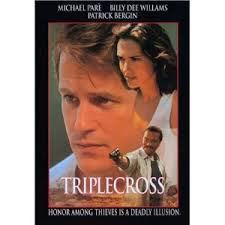
TRIPLE CROSS
US, 1994, 95 minutes, Colour.
Michael Pare, Ashleigh Laurence, Billy Dee Williams, Patrick Bergin.
Directed by Jodi Reno.
Triple Cross is a Showtime telemovie, a conventional variation on prisoner working for FBI, set-up heist and double and triple crossing. The film gives the opportunity for Patrick Bergin to play yet another sociopath. Billy Dee Williams is the FBI agent and Michael Pare is at home with the ex-con who helps him.
Nothing particularly new - mainly predictable with a few twists at the end.
1.Telemovie thriller? FBI pursuit of criminals, set-ups?
2.The prison settings, the robberies, the affluent Colorado mansion? Musical score?
3.The structure of the screenplay: the confrontation between Oscar and Jimmy Ray? The set-up and Julia's betrayal of her accomplice? The shooting? Oscar and his recruiting Teddy? Teddy infiltrating, caution about the relationship with Julia? The relationship, the checking of the robbery? The double-cross during the robbery, the pursuit, the getting of Jimmy Ray? The escape of Teddy? Julia on her own? Oscar vindicated?
4.Oscar and his obsession, tracking down Jimmy Ray? The final irony when it was revealed that he was obsessed with Julia and had placed her in Jimmy Ray's household? The deal with Teddy, following him, the robbery, Teddy taking the jewels? The pursuit, his boss and his exasperation? The shootout and his bullet-proof vest? Helping Teddy to start a new future?
5.Teddy, playing chess in jail, his story and background told to Julia? Educating himself? His knowledge of Jimmy Ray? Infiltrating into Jimmy Ray's friendship, taken home, warned against Julia, falling in love, the relationship, the dangers? His persuading Jimmy Ray to believe him? the double cross and taking the jewels, trying to fence them, the guru and his trying to reform? The shootout, the gravestone, the chance of a new life?
6.Jimmy Ray, his violence, shooting the young man at the beginning of the film? Sexual relationship with Julia, the violence? At home, becoming respectable? The violence playing pool, the encounter with Teddy, taking him home, warning him? The power over Julia and getting her to find out the truth? His finding the truth - but double crossed? Collaborating with Oscar, shooting Oscar - and being shot himself? Portrait of a sociopath?
7.Julia, participating in the robberies? Her relationship with Jimmy Ray, dependence on him? Her coming on to Teddy, lack of trust, the relationship? Finding out the truth and telling Jimmy Ray? The irony of her being placed there by Oscar? His resentment of her staying with Jimmy Ray? At the grave, having lost both men? A future?
8.The FBI, pursuits of criminals, obsessions?
9.The psychological drama, the triple crosses, action? And the fashionable dollops of sex and violence?
Published in Movie Reviews
Published in
Movie Reviews
Tagged under
Saturday, 18 September 2021 19:21
Terror in the Family/ 1996
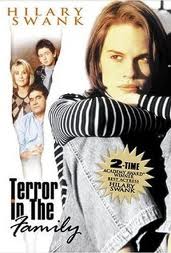
TERROR IN THE FAMILY
US, 90 minutes, 1996, Colour.
Joanna Kerns, Hilary Swank, Anne Lauria.
Directed by Gregory Goodell.
Terror in the Family is an American telemovie that focuses on dysfunctional families - on the surface seeming to cope, but with deep underlying problems. The father has tended to be passive, allowing the mother to oversee the house. However, she has doted on her daughter and has spoilt her. At 15, the daughter is rebellious, seeing a fellow student with whom she is having a sexual relationship, has outbursts of violence, especially striking her mother. The young boy of the family, staying at home to hear the quarrels and covering up for his sister, has begun to drink.
The film focuses on the anxieties of the parents, especially as the mother becomes alcoholic. The film is sympathetic to the parents, critical of the children - but ultimately making a plea for understanding the children and acknowledging the faults of the parents. The film ends optimistically with the family going to counselling.
1.The impact of this kind of American telemovie, tailored for the television audience? American families and their problems? Dramatising problems, suggesting solutions?
2.The small American town, the American household, the town? Neighbours, the school? The abandoned rollercoaster? The musical score?
3.The title of the film? Seemingly sensational for its topic? The irony of the teenage girl causing the terror?
4.The structure of the film: the family clash and the injuries, the police? Three months earlier? The credible dramatising of the crises that led up to the clash? The aftermath with the court, probation, the daughter staying with her aunt? The parole? The final judgment, going to counselling?
5.The portrait of the teenage girl? Her untidy room, her music, going out, ignoring her parents? Her relationship with the boy? Sexual relationship? Her getting her brother to write notes and cover for her? Her reactions and physically striking her mother? Her lies? Playing with the band? Being found out, the lies, the cover-up? The continued violence? The apologies, watching television with her mother? The clash with her father and breaking his fingers? The brother calling the police? Her being arrested, charged? In jail and the treatment? Her ringing her boyfriend? The court hearing, the probation? Her staying with her aunt? Growing improvement? The plan to run away with her boyfriend? Her mother's visit and her desperation? The final confrontation, the court? The possibilities of therapy? A credible portrayal of a teenage girl, her behaviour, the causes within the family, within herself?
6.Cynthia and her household, orderly, controlling it? Yet spoiling her daughter? The alienation from her husband - and his going into the cellar to make bowls? The irony of their not wanting the children and the possibility of an abortion? The daughter feeling this? The mother unable to deal with her daughter, tidying her room, being ordered out, hit? Her drinking? Her criticism of her husband? Looking after her mother - and her mother's harshness? The clash with her sister and her rebellion? Forcing the young son to play for the visitors? Her losing control, accepting her daughter's lies, finding out the truth, going to the school but lying for her? The punishment and the grounding - yet wanting to concede? The final blow-up, her anger, her upset about the arrest? The phone calls, her visit with the pizza, her drinking? The relief in court? The confrontation with her sister and the truth told about her relationship with her, with her mother? Coming to terms with her husband? The discovery of her son's vodka bottle? Her refusal to go to therapy - but her final coming? Hope for the future?
7.Todd, the gentle father, leaving things to his wife? His pride in his work, making his dishes? Seeing the truth about his daughter, his relationship with her? Her threatening him with charges of rape? His bewilderment? Wanting to take a stand with his wife, ultimately taking the drink from her? His injuries, in the hospital, in the court? The decision to go to therapy?
8.Adam, his age, covering for his sister, hearing the quarrels, his intelligence and assessment of the situation? The piano, self-conscious? Drinking the vodka? His anxiety and phoning the police? Going to therapy?
9.Cynthia's mother, her harshness, her drinking? Harsh tactics for dealing with children? Anger at her younger daughter?
10.The younger daughter, rebelling, going away from home? Visiting, being supportive of her niece? Taking her during the probation period? Her wise dealing with her niece?
11.The boyfriend, the harsh background at home with his mother and her boyfriends? Suspended? The band? Depending on his girlfriend? Together, in the house? The plan to run away? Going up to the roller-coaster? Talking of suicide? In court, his wanting to go away, his being caught by his girlfriend, his explanations? His final disillusionment when she took a stand?
12.Therapists, their wisdom and analysis of the situation? The judge in the court?
13.Typical of behaviour in American families? A useful psycho-drama for reflection and discussion?
Published in Movie Reviews
Published in
Movie Reviews
Tagged under
Saturday, 18 September 2021 19:21
Take the High Ground
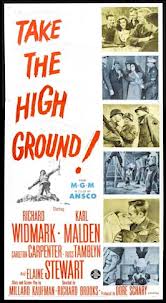
TAKE THE HIGH GROUND
US, 1953, 101 minutes, Colour.
Richard Widmark, Karl Malden, Carleton Carpenter, Elaine Stewart, Russ Tamblyn, Jerome Courtland, Steve Forrest.
Directed by Richard Brooks.
Take the High Ground was directed by Richard Brooks, novelist (Crossfire), who moved into writing and directing in 1950 with Crisis and continued his career as a director through to the mid-'80s. His films include adaptations of Tennessee Williams, Cat on a Hot Tin Roof, Sweet Bird of Youth, as well as Lord Jim, In Cold Blood.
Richard Widmark is the drill sergeant - a forerunner of Louis Gossett in An Officer and a Gentleman and Lee Ermey in Full Metal Jacket. He shows what can be done without the benefit of four-letter word language and explicit sexual reference in his verbal onslaught on his recruits. Karl Malden is his assistant. The recruits include young stars at MGM at the time, Russ Tamblyn, Carleton Carpenter, Robert Arthur, Steve Forrest. Elaine Stewart is the leading lady.
By now, this material is cliche. However, this is an example of how it was treated in the early '50s.
1.Interesting military drama? Training of recruits? American military attitudes? The atmosphere of the post-World War Two experience and Korea?
2.Colour photography, Texas locations? The camp, the town? Musical score?
3.The title, the opening sequence, the hill on Korea? The symbol of taking the high ground? During the training?
4.The focus on Drill Sergeant Ryan: Richard Widmark's presence and style? His own experience of war? The cloud over his career? His assistant and the bond between them? His spiel for the arrival of the recruits, praising the former group? His training methods? The humiliation, the verbal onslaught, the criticism? Drill, the barracks? The military training, the lack of expertise, the mistakes and his capitalising on these? His ridiculing of the men? Excessive punishments? His reason - 16 weeks to train them? In town, the humiliation of the men? The encounter with Julie, his attack on her? His going to her apartment, love for her? Love-hate? Humiliating her? His proposal? Apology? Individual encounters with the men, the boy wanting to desert, Tex and his rifle practice and shooting between Ryan's legs? Winning the admiration of the men? Reconciliation with his assistant after their clash? The new recruits?
5.Ryan's assistant, genial man, good support, war experience? The relationship with the men, supporting Ryan, supporting them, punching him out, the clash over Julie?
6.The presentation of the recruits: their arrival, smart talk, attitudes, bewilderment? The barracks, the meals, the drill, the training, the shooting practice, the manoeuvres? The time off? Joking around, the pillow fight and horsing around? The change over the 16 weeks? Their hatred of Ryan - as part of the training to have a focus of their dislike?
7.The individuals: the man who wanted to kill him and went to the chaplain for advice? Russ Tamblyn and his smart mouth, athletics, dancing with the girls? The rich young man, his getting frantic, drinking the water and the canteen being emptied, his attempted escape? Ryan's father being a deserter and his telling this young man? The Texan and his father's military career, the shooting? The black man and his poetry, letters? The Indian and his background?
8.The picture of army life, macho methods? The necessity of such training for support in war action? The familiar material and its treatment in previous films, subsequent films?
Published in Movie Reviews
Published in
Movie Reviews
Tagged under
Saturday, 18 September 2021 19:21
Two Jakes, The
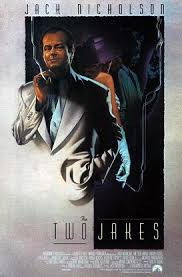
THE TWO JAKES
US, 1990, 137 minutes, Colour.
Jack Nicholson, Harvey Keitel, Meg Tilly, Madeleine Stowe, Eli Wallach, Ruben Blades, Frederic Forrest.
Directed by Jack Nicholson.
The Two Jakes is the long-expected sequel to Roman Polanski's Chinatown. As with the original, the screenplay was written by Robert Towne (Personal Best, Days of Thunder). It takes up the themes begun in Chinatown, moves to the post-World War Two period in Los Angeles, continues the themes of greed, politicking, violence, cover-ups.
The Two Jakes, however, is Jack Nicholson's film. He stars and directs.
The film was not well received in the United States. Perhaps it was too complex and complicated for the ordinary audience. While Chinatown was taut, The Two Jakes is much less tight. It also lacks the presence of a strong female star like Faye Dunaway as well as a towering villain like John Huston.
However, the film is an interesting film noir, takes us back to Hollywood conventions of the late '40s as well as themes in Los Angeles and California at the time. Harvey Keitel gives a very good performance as the other Jake.
1.Impact of the film? Audience reaction at the box office? The continuation of Chinatown? Comparisons with the original?
2.The work of Jack Nicholson, in Chinatown, acting and directing here? The writing of Robert Towne?
3.The film noir, the private eye thriller, Los Angeles setting, piece of Americana, violent deaths, the law, police investigations, greed, corruption and cover-ups? And the recurring theme of the earthquakes shattering people in Los Angeles?
4.The complexity of the plot, motivations? The threads of plot and resolutions? How satisfying?
5.The title, the focus on the two men, the parallels, their stance with the law, their stance with the Mulwray family, with Kitty? The changing impressions of Jake Burman? Changing sympathies?
6.The links with Chinatown, Fay Dunaway and the photos, the articles? Her reading the letter? The newspapers? Kitty Mulwray and the ownership of the land? Memories?
7.Memories and the theme of the past? The question whether people can be free of the past? Past evil and greed and their results? Violence? The need for protection? Changing situations?
8.Jack Nicholson as Jake Gittes: age, size, appearance? At work, feet on the desk, discussions with Jake? Rehearsing his court appearance? His status as a private eye, objections to private eyes - the leper with the most fingers in L.A? His staff and their helping him? The plan for catching Kitty, the photos? The taping of the events? The sudden violence and the murder? The importance of the tape? The lawyer and his contact with Jake, wanting the tape? Escobar and his interest in the case, relationship with Jake? Loach and his antagonism, the fight in the precinct? The background of the affair, Baudine and his womanising, his wife and her behaviour, hysterical, visiting Jake, listening to the tape, seductive? Jake meeting Burman and Kitty - not recognising her? His investigations, documents, signatures, ownerships? The investigation, the land and the deals? Money? Nick and his tough? The brutality with Jake? The fight? His relationship with his fiancee - and neglecting her? A complex character?
9.Jake Burman, his character, reaction to his wife's adultery, preparing the court case? Relationships, his partnership with Baudine, the gun and Baudine's death? The murder, the revelation of the delivery of the chair, the gun? His playing golf, the collapse? His illness, the x-rays? The truth about the blackmail? His love for Kitty, wanting to protect her? The illness, the earthquake, the match - and his lighting it, the gas and his killing himself? For Kitty's sake?
10.Kitty, initial appearance, enigmatic, the sexual relationship with Baudine? Part of a plot? At the hairdresser's and meeting Jake, their discussions? Her not knowing the truth about her husband's illness? Thinking he was neglecting her? Her affair? The truth about her identity, the brooch in her hair? Her knowledge about Jake and manipulating him? The heritage of the past? Her sexual advances towards Jake? His fatherly attitude? Going to begin a new life?
11.The Baudines, partnerships, money, the deal with the tycoon? The wife and her reaction to the murder? Her lawyer and his instructions? The connection via the lawyer with the tycoon and his wife? The truth about Baudine, his wife and her seductive behaviour with Jake? Appearing in court, listening to the doctored tape - and the hysterical outburst?
12.The tycoon, his wealth, his wife, link with Baudine? The lawyer acting in his interests? The plans, the mineral rights? His lies? Greed?
13.Loach, the police background, clashes with Jake, the anger and taunts, the fight? The final confrontation and his humiliation and wetting himself? Escobar, the police, investigations? Antagonism towards Jake?
14.The lawyer and his client, friendship with Jake? The tycoon's lawyer and the confrontations with Jake? The use of the law?
15.Jake and his involvement, neglecting his fiancee, the puzzle, the dangers, the violence? Kitty and the brooch and his memories, the truth? His fatherly attitude towards Kitty? Protecting her, altering the tape?
16.A satisfying resolution, justice? Who wins? And not being free of the past?
Published in Movie Reviews
Published in
Movie Reviews
Tagged under
Saturday, 18 September 2021 19:21
Teenage Mutant Ninja Turtles
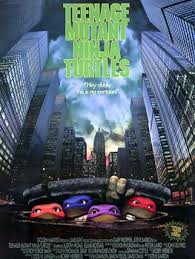
TEENAGE MUTANT NINJA TURTLES
US, 1990, 93 minutes, Colour.
Judith Hoag, Elias Koteas.
Directed by Steve Barron.
Teenage Mutant Ninja Turtles were a craze across the world in the late '80s and early '90s. Originally a tongue-in-cheek comic strip in the United States, gently spoofing the heroics of Superman, Star Wars etc., it was turned into an animated television series and then marketed for all kinds of toys and commercial merchandise. Rather late in the day comes this full-length feature with the Turtles, not animated, but rather designed by Jim Henson's Muppet-style workshop.
It is an enjoyable cross between Star Wars, Superman and The Karate Kid. It is good-natured, as are the classically-named Turtles themselves. It is the old story of city crime and gangbusters - with touches of violence and a philosophy of discipline. In fact, the old sage rat Splinter is the nicest Master since Obi- Wan- Kenobi.
Not too serious, delighting in its oddball premises, and good versus evil, it is full of message exhortations as well and is surprisingly enjoyable for adult audiences as well as youngsters.
1.The background of the Turtles, comic strip, spoof, television animated series, merchandise? A hit throughout the world in the '80s?
2.Popular response to the Turtles, younger audiences, parents? Moral and education lobbies against the alleged violence? How violent is the film? In its context, treatment of its theme?
3.The traditions of the gangbuster films, crime in the city, martial arts features and The Karate Kid, Star Wars and wise Masters?
4.An entertaining fantasy? Touches of realism in the modern city? The modern language and jargon? The use of the media? Youth themes, growing up, law and order? Mythical heroics?
5.Splinter as the Master, his story, the rat, Japan, the martial arts and learning from his Master, falling in love, the death of his Master, Shredder, revenge? The flashback styles? Shredder as the enemy? The finding of the Turtles, their contamination by the radioactive material? Their quick growing up? Speaking, his teaching them his wisdom? The patient grandfather figure with the rowdy teenagers? Their growth, his advice? A character of peace?
6.The young Turtles themselves, types? Their story, their classical names, their origins, American youth, love for pizza - and slicing it? Their fooling around, spats and jealousies, fighting? The confrontation with Casey? Saving April? Telling her the story? The growing involvement, April's apartment and its destruction, her boss, Danny and the gang? The Foot and their attacks, in the subway, at their home, in the drains? The kidnapping of Splinter? Strategies, going to April's farm and training? The discovery of Splinter's whereabouts? The media interviews and their response? Casey and his help? April, the kids under Shredder's influence, the final fight, the confrontation with Splinter? Splinter's victory?
7.The identities of the Turtles, their style, mannerisms, leadership, youngsters, their martial arts skills?
8.April, the television reporter, strong views, attacks on the police, interactions with her boss, being mugged, saved by the Turtles? Her investigations of the Foot, the attack on the police, the visit to the Commissioner? Her listening to the Turtles' story, her investigations, her apartment and its destruction, the friendship with Casey? Being sacked? The final interview, opening up the questions of law and order? The training of the Turtles, the final fight - and her bargaining with Charles for better conditions? Kissing Casey?
9.Casey, the vigilante, his style, the fight with the Turtle, law and order, rediscovering the Turtles, joining in with them, attracted to April?
10.Shredder as the villain, the Samurai background and style, his mutilation? The Oliver Twist and Fagan aspects of the story? The discontented kids, his control over them? The crack Ninja squad? Vengeance and attacks, the final confrontation with Splinter, his death?
11.Danny and his father, the busy boss, the young boy taking his father's money? Father's severity? Running away, the police? Joining the youngsters in Shredder's headquarters, the video games and their way of life, freedom, robberies, organised crime in the streets? The conscience for Danny, helping the group? Liberating the youngsters?
12.The build-up to the climax, right versus wrong, good versus evil - and the expected heroic victory?
Published in Movie Reviews
Published in
Movie Reviews
Tagged under
Saturday, 18 September 2021 19:21
Turtle Diary
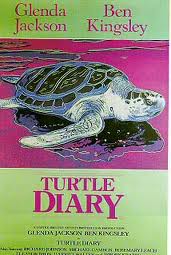
TURTLE DIARY
UK, 1985, 97 minutes, Colour.
Glenda Jackson, Ben Kingsley, Richard Johnson, Michael Gambon, Harriet Walter, Nigel Hawthorne, Eleanor Bron.
Directed by John Irvin.
Turtle Diary is based on novel by Russell Holven, the adaptation by playwright Harold Pinter. It has a very good cast led by Glenda Jackson and Ben Kingsley with Michael Gambon (The Singing Detective) as the keeper. Eleanor Bron and Nigel Hawthorne, amongst others, have cameo roles in support.
The film is a portrait of two people, a comment on freedom, the background conservation. Direction is by John Irvin, perhaps better known for such action films as Hamburger Hill and Raw Deal with Arnold Schwarzenegger.
A gentle and insightful film.
1.Entertaing? Insight? Portrait of people? A quest? Nature?
2.London settings, the aquarium, flats? The countryside and the sea? Musical score?
3.The title, the novel and Pinter's adaptation? The focus on people and the diary? On the turtles and nature and their freedom?
4.The credits and the turtle sequences, the aquarium, confined, nature? The turtles in themselves, so long in captivity? Watched? Neaera and William? The keeper and his knowledge and concern? Their being returned to the sea, the plan, the crate, the car, the drive, the beach? The empty sea? The aquarium and their absence?
5.The sense of achievement, nature returning to nature, conservation and freedom?
6.Glenda Jackson and Neaera: the writer, her knowledge of nature, her going to her publisher, wandering the aquarium, buying the book, the encounters with William? Discussions with the keeper, the plan, the discussions, having the nerve? Her friendship with Mr Johnson? Her decision to go, the execution of the plan, the exhilaration at the beach, the night in the camper van, the return? Her relationship with the keeper, sexual encounter? Its meaning? The final toast with William? Unblocking her creative writing? Her future?
7.William and his background, his explanations of himself, the flat, friendship with the landlady, his irritation with the untidy guest, Miss Neap and her concern, upset at the note? His work, the shop, the affair with Harriet and the bond between them? The turtles, the keeper, discussions? The meeting with Neaera and the discussion? Making the crate, the actual liberation of the turtles? The fight with the untidy guest, the reconciliation, Miss Neap's death? His meeting again with Neaera - his future?
8.The keeper, 27 years in the aquarium, concern for the turtles, noticing William and Neaera, helping, discussing? The plan? Neaera's return, the sexual encounter?
9.The landlady and her interest, Miss Neap and her mother, going to the theatre, hurt because of William's note, the pathos of her death and her note - not to tell her mother? The dirty guest, the bathroom and the kitchen, the fight?
10.The atmosphere of the shop, Harriet and the work?
11.Mr Johnson, his being away, Neaera minding his things? His minding Neaera's?
12.The publishers, their concern, style?
13.A glimpse of characters? Interactions? Conservation? Symbol of freedom?
Published in Movie Reviews
Published in
Movie Reviews
Tagged under